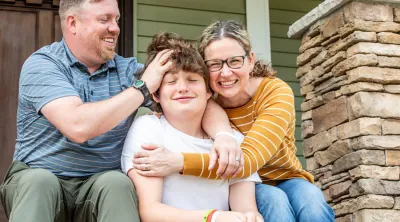A Rhode Island program trains coaches to deliver personalized exposure therapy
Owen* is a middle schooler from a family of five in northern Rhode Island. He loves lacrosse. You can’t tell by looking at him, but until recently, obsessive compulsive disorder (OCD) derailed Owen’s life.
Then, a personal coach from an innovative child and adolescent mental health practice called Braver began helping Owen do things he couldn’t have imagined doing a year ago: things like getting dressed, taking a shower, crossing the kitchen floor or putting his lacrosse gear in the trunk.
Parents witness a heartbreaking struggle with OCD
Owen’s mother Erin* tears up remembering the day she watched Owen get stuck in the hallway, unable to cross the lines in the wooden floor. They were in a hurry to get to a relative’s house. He was starving after practice, and she’d made him pizza.
“He had to step a certain way to get to where he was going,” says Erin. “And he kept ‘messing up’ the ritual.” The “ritual” was a series of steps Owen had to complete to allow himself to move forward. Get it wrong, and he forced himself to start over.
Owen says his OCD was like a spam caller, an intrusive presence he couldn’t block. Every morning, he agonized over wearing the same shirt every day. In the afternoons he had to pack his lacrosse gear just a certain way in the trunk. Owen worried something would go wrong at lacrosse or that someone would get hurt based on how well he stuck to those routines. Over the years, those routines turned to rituals, rituals that spilled into every aspect of Owen’s day.
The need to find care escalates
“The moment we realized we needed to find someone, something bigger than just us having conversations with him, we were actually sitting right here,” says Erin, her husband Brian joining her at the dining table.
Owen’s parents called the pediatrician, who gave them a list of therapists and programs. It would take nearly a year before Owen found treatment that worked. “We were on a waiting list at two places, and I had to call one of them every week during my lunch break,” says Erin.
Owen gets his own personal exposure therapy coach
The clouds parted when Owen’s family learned about Braver, a unique program which Blue Cross & Blue Shield of Rhode Island (BCBSRI) found innovative ways to incorporate into its mental health offerings. The practice specializes in exposure therapy, which is the gold standard for OCD treatment. But Owen would not have to receive treatment in a clinician’s office. A Braver coach, a bachelor’s level provider trained and supervised by Braver’s psychologist and psychiatrist, would come to Owen’s home once a week to work on challenges. Little by little, Owen’s coach would help him complete a challenge until he could do something without needing to perform a ritual.
Braver and BCBSRI collaborated to expand access to effective treatment through these coaches. One psychologist trains and supervises three coaches at a time, tripling the number of patients who can be seen in a week. Exposure therapy is a great example of the kind of therapy non-traditional “treaters” can provide: it’s easy to teach, easy to measure quality and more effective than what might happen in a doctor’s office because it doesn’t simulate the real world. It is in the real world.
Completing weekly challenges helps Owen find hope
On a recent weekday, Owen’s coach, a bearded, outgoing young man who seemed to put the whole family at ease, came over after school to work with Owen on choosing a shirt. Previously, Owen froze while trying to pick something to wear. The wrong shirt could cause him to lose a lacrosse game. He would get stuck in his room, caught in the loop of rituals. His coach proposed a challenge: narrow the choices down, then roll a die to pick a shirt. The challenge is paying off. There are still only a handful of shirts Owen can wear. But he’s reclaiming his life one roll of the die at a time.
“Help is out there,” says Owen’s father Brian. Owen is improving. “It's extremely tough in the moment, and you feel like it's going to be a lifelong thing,” says Brian, “but it does get better with treatment.”
*We’re not using Owen’s or his family’s last name to protect their privacy.
Expanding our ability to help kids get grounded
Blue Cross and Blue Shield (BCBS) companies are partnering with Boys & Girls Clubs of America (BGCA) to help Clubs ensure staff have the training to work with kids experiencing mental health issues—in particular, trauma. What’s more, many Clubs have dedicated sensory rooms where kids who feel overwhelmed can find support in a calm environment. BCBS companies’ $10 million investment will help BGCA empower Club staff in trauma-informed practices to help millions of kids. It’s one of the many ways BCBS companies are tackling the youth mental health crisis. Learn more about the project.
Blue Cross & Blue Shield of Rhode Island is an independent licensee of the Blue Cross Blue Shield Association, an association of independent, locally operated Blue Cross and Blue Shield companies.

